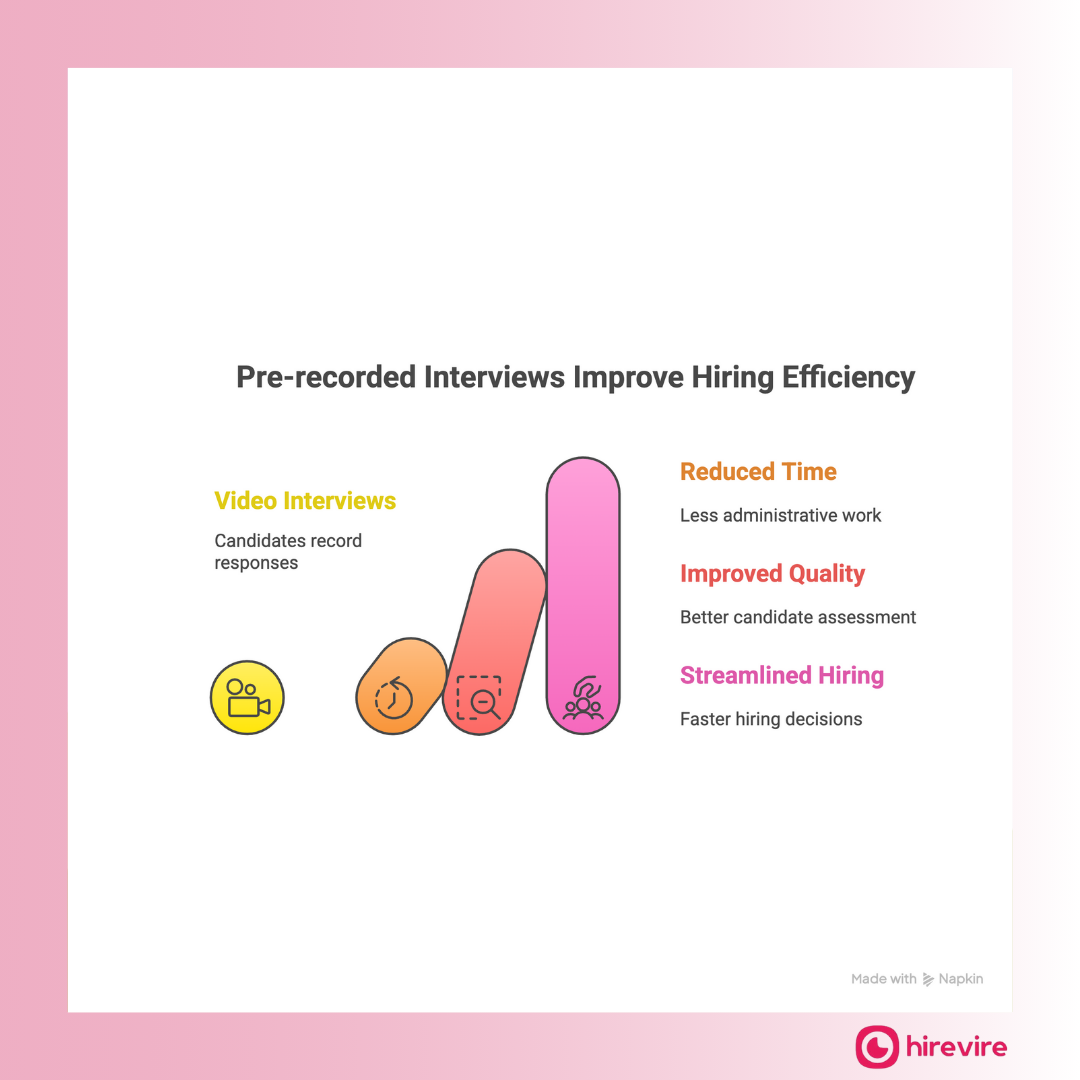Summary:
Pre-recorded video interviews are revolutionizing recruitment by eliminating scheduling hassles and administrative burdens, allowing HR teams to focus on evaluating talent. This approach enables candidates to record responses at their convenience, which recruiters can review asynchronously, saving time and improving hiring quality. Platforms like Hirevire offer comprehensive features at competitive prices, facilitating seamless integration into existing HR processes and enhancing global recruitment efforts. This method not only accelerates time-to-hire but also broadens the talent pool and improves candidate experience, making it a valuable tool for modern recruitment strategies.
Table of Contents
The Global Coordination Nightmare
The Modern Solution: Pre-recorded Video Interviews
What is a Pre-recorded Video Interview and How Does Video Interviewing Work?
How It Differs from Live Interviews
Benefits: How Pre-recorded Interviews Improve Hiring Efficiency
Save Scheduling Time Across Time Zones and Continents
Widen Talent Pool with Location-Agnostic Screening
Enable Consistent, Structured, and Fair Candidate Evaluation
Accelerate Process—Filter Unqualified Candidates Early
Provide Data for Hiring Analytics and Improved Employer Brand
Enhanced Employer Brand Perception
Cost and Resource Optimization
How to Prepare for a Pre-recorded Video Interview Process?
Step 1: Recruiter Designs Questions
Step 2: Candidates Receive Link and Record Responses
Step 3: Asynchronous Review and Team Collaboration
Step 4: Progress Tracking and Next Steps
Pre-recorded Interview Questions: What to Ask in Video Interviewing Sessions
Behavioral Assessment Questions
Role-Specific Technical Questions
Question Design Best Practices
Best Pre-recorded Video Interview Platform: Hirevire for Video Interviewing
Why Recruiters Choose Hirevire
Alternative Video Interviewing Tools for Pre-recorded Interview Processes
Why Hirevire Leads the Market: Comparison Table
Industry-Wide Adoption and Success Rates
Market Growth and Future Outlook
Operational Benefits and Cost Reduction
Real-World Implementation Success
Frequently Asked Questions (FAQs)
How do pre-recorded video interviews improve my hiring efficiency?
What should I include in my pre-recorded interview questions?
How do I evaluate candidates fairly using pre-recorded interviews?
How do platforms like Hirevire help with collaboration and workflow?
How can I ensure a great candidate experience with pre-recorded interviews?
Are pre-recorded video interviews secure and compliant with global data regulations?
What results have recruiters seen with Hirevire?
What if I need to screen candidates across multiple roles or regions?
How to Prepare for Video Interviewing: Implementation Guide for Pre-recorded Interviews
Picture this: It's 3 PM on a Wednesday, and Sarah, an HR manager at a growing tech startup, is juggling her fifth scheduling email of the day. She's trying to coordinate a simple 15-minute screening call between a candidate in Berlin and her hiring manager in San Francisco, while simultaneously reviewing resumes for three other open positions.
Sound familiar? You're not alone.
The Time Drain Reality
Here's what's really happening in recruitment today: LinkedIn Talent Solutions reports that recruiters spend up to 60% of their time on administrative tasks like scheduling interviews and sorting resumes. That's nearly 4 out of every 5 working hours dedicated to scheduling, coordination, and paperwork instead of finding the right people for your team.
The impact on hiring quality is significant, with research showing that, according to the Centre for American Progress, replacing a bad hire can cost a company as much as 213% of the salary for highly skilled roles due to the impact on productivity.
The Global Coordination Nightmare
In our increasingly remote-first world, the traditional interview process has become a logistical nightmare. Companies are struggling to coordinate live calls across multiple time zones, leading to endless email chains and qualified candidates slipping through scheduling cracks.
The Volume Challenge
Growing companies face an even bigger problem: scale. As your business expands, so do your hiring needs. But here's the catch – your HR team doesn't grow at the same pace.
The traditional approach of scheduling individual screening calls becomes unsustainable when dealing with high application volumes, leading to bottlenecks and delayed hiring decisions.
The Modern Solution: Pre-recorded Video Interviews
What if there was a way to eliminate the scheduling chaos, dramatically reduce administrative time, and actually improve the quality of your candidate assessment?
Enter pre-recorded video interviews – a game-changing approach that's transforming how forward-thinking companies screen candidates. Instead of playing scheduling ping-pong, candidates record their responses on their own time, and you review them when it works for your schedule.
Companies implementing platforms like Hirevire are discovering they can maintain (and often improve) the quality of their hiring process while reclaiming hours of their week for strategic work.
What's Coming Next
In this comprehensive guide, we'll walk you through everything you need to know about pre-recorded video interviews – from understanding the basics to implementing a system that transforms your hiring efficiency. You'll discover practical strategies, real success stories, and exactly how to choose the right platform for your team's needs.
Ready to join the thousands of companies that've already said goodbye to scheduling headaches and hello to streamlined hiring? Let's dive in.
What is a Pre-recorded Video Interview and How Does Video Interviewing Work?
A pre-recorded interview is an asynchronous screening method where candidates respond to predetermined questions by recording video, audio, or text responses on their own time. Unlike traditional live interviews that require real-time coordination between recruiters and candidates, pre-recorded interviews eliminate scheduling constraints entirely.
How It Differs from Live Interviews
Traditional Live Interviews:
- Require synchronised schedules across time zones
- Limited to specific time slots
- Immediate responses without preparation time
- Single attempt at answering questions
Pre-recorded Interviews:
- Complete time independence for both parties
- 24/7 accessibility from any location
- Candidates can prepare and practice responses
- Option for multiple recording attempts
The Asynchronous Advantage
Pre-recorded interviews operate on an asynchronous model where candidates receive a unique link to access interview questions. They can then record their responses using any device with a camera and microphone, submitting them when ready. This approach allows unlimited simultaneous candidate evaluations without additional recruiter time investment.
Research shows that pre-recorded video interviews save significant recruiter and administrative time while enabling more thorough candidate assessment. Platforms like Hirevire have perfected this process by offering multi-format response options, ensuring both technical and non-technical roles can be effectively screened.
Key Process Elements
The pre-recorded interview process typically involves:
Question Setup: Recruiters create a mix of video, audio, and text-based questions tailored to the role requirements.
Candidate Access: Applicants receive a secure link that requires no login or special software installation.
Response Recording: Candidates record their answers using built-in recording tools, with the flexibility to re-record if needed.
Team Review: Hiring teams can review responses asynchronously, rate candidates, and share feedback with colleagues.
This elimination of scheduling coordination represents a fundamental shift in recruitment efficiency. Instead of spending hours coordinating calendars, recruiters can focus on what matters most: evaluating talent and making informed hiring decisions.
The asynchronous nature also expands your talent pool beyond geographical constraints, making it particularly valuable for remote-first companies or roles requiring global candidates.
The Statistical Impact
The adoption of video interviews has transformed recruitment efficiency significantly. Research indicates that 74% of recruiters report video interviews simplify their process, while 86% of employers now use video interviews as part of their screening workflow.
The time savings are particularly notable, with organisations implementing video interview systems reducing their time-to-hire by up to two weeks or more. This acceleration comes from the ability to screen multiple candidates simultaneously without the traditional scheduling bottlenecks.
Enhanced Team Collaboration
Pre-recorded video interviews excel at improving hiring team coordination. Unlike live interviews, where only present stakeholders can evaluate candidates, video responses can be shared across departments and reviewed by multiple team members at their convenience.
This collaborative approach leads to better hiring decisions through diverse perspectives and reduces interviewer bias by enabling structured, consistent evaluation criteria across all candidates.
The visual element also helps hiring teams better assess cultural fit and communication skills before investing time in final interview rounds, ultimately improving the quality of hire while reducing recruitment costs.
Benefits: How Pre-recorded Interviews Improve Hiring Efficiency
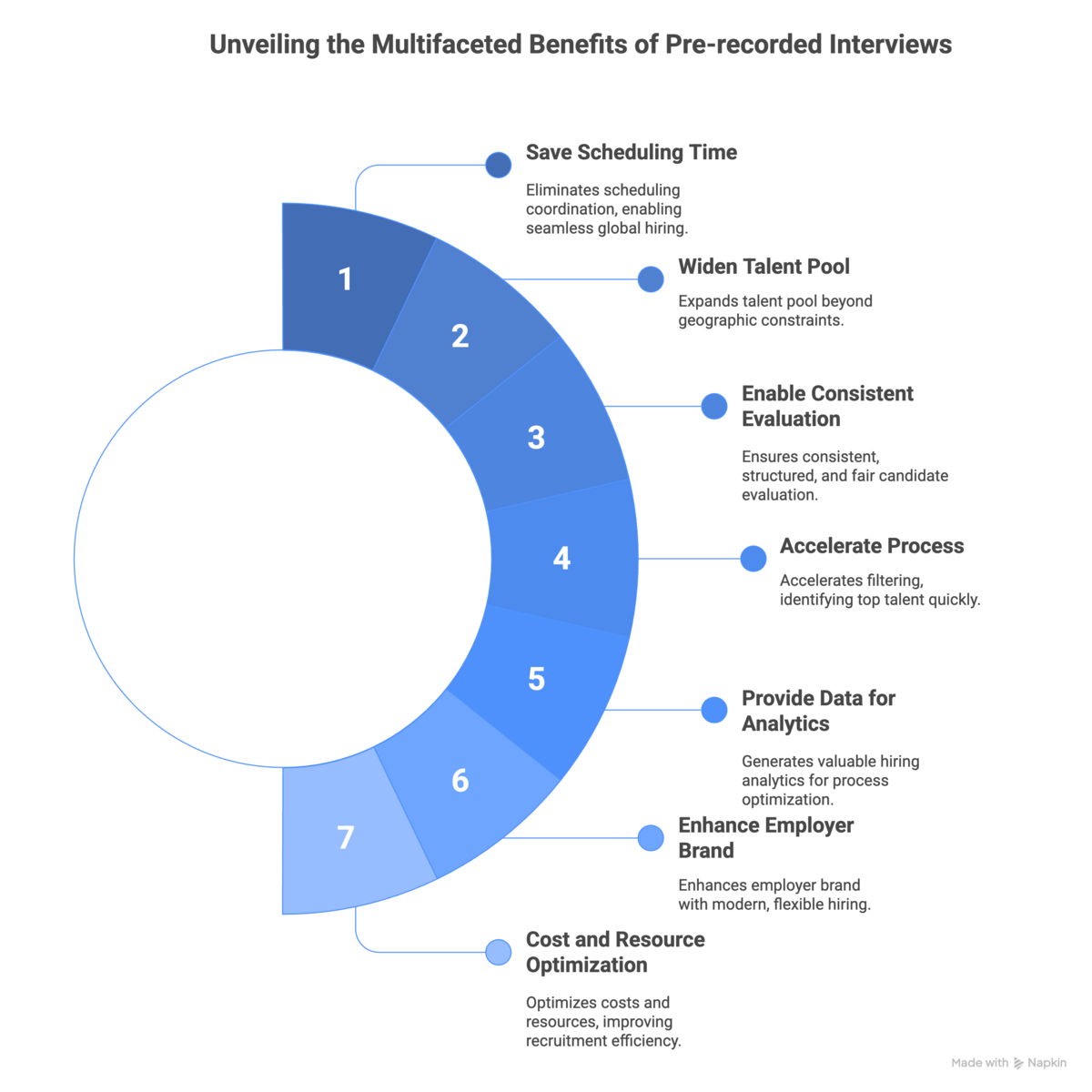
Pre-recorded video interviews deliver transformative benefits that address the core challenges facing modern recruitment teams. Here's how this approach revolutionizes hiring efficiency across multiple dimensions.
Save Scheduling Time Across Time Zones and Continents
The most immediate benefit is the complete elimination of scheduling coordination. Traditional interviews require finding mutually convenient times across different time zones, often resulting in weeks of delay for a simple 15-minute screening call.
Pre-recorded interviews remove this friction entirely. Candidates can record responses at 2 AM in Tokyo or 6 PM in London – whenever works best for them. Recruiters review these responses during their optimal working hours, creating a seamless global hiring process.
For companies hiring internationally or managing remote teams, this represents a game-changing efficiency gain. What once took days of email coordination now happens instantly.
Widen Talent Pool with Location-Agnostic Screening
Geographic constraints often force companies to settle for local talent or exclude qualified candidates due to time zone complications. Pre-recorded interviews break down these barriers completely.
Your talent pool suddenly expands from local candidates to global possibilities. A startup in San Francisco can easily screen developers in Eastern Europe, marketing professionals in Australia, or sales representatives across multiple continents – all without a single scheduling headache.
This expansion is particularly valuable for specialised roles where the best candidates might be located anywhere in the world.
Enable Consistent, Structured, and Fair Candidate Evaluation
Pre-recorded interviews create standardisation that's impossible with live interviews. Every candidate answers identical questions under similar conditions, eliminating the variables that can skew traditional interview results.
This consistency reduces interviewer bias significantly. When one recruiter is having a good day and another is stressed, live interview scores can vary dramatically for similar candidates. Pre-recorded responses level this playing field.
The structured format also ensures comprehensive evaluation. Unlike live interviews where conversations can drift off-topic, pre-recorded formats keep assessment focused on role-relevant criteria.
Accelerate Process—Filter Unqualified Candidates Early
Pre-recorded interviews excel at early-stage filtering, allowing recruiters to quickly identify top talent before investing time in comprehensive interviews. Instead of spending 30 minutes on a live call with an unsuitable candidate, recruiters can assess fit in just a few minutes of video review.
This acceleration enables teams to prioritize their time on the most promising candidates. The screening that once took weeks now happens in days, with better quality outcomes.
High-volume hiring becomes manageable when you can process dozens of candidates simultaneously rather than scheduling them one by one over several weeks.
Provide Data for Hiring Analytics and Improved Employer Brand
Pre-recorded platforms generate valuable hiring analytics that traditional interviews can't provide. Track response rates, completion times, candidate engagement, and assessment scores across different roles and hiring managers.
These insights help optimize your hiring process continuously. Which questions generate the most useful responses? Which roles have the highest candidate completion rates? Where are the bottlenecks in your hiring funnel?
The data also supports more objective hiring decisions by providing quantifiable metrics rather than relying solely on subjective impressions from live conversations.
Enhanced Employer Brand Perception
Modern candidates increasingly expect flexible, technology-forward hiring processes. Pre-recorded interviews signal that your company embraces innovation and respects candidate time constraints.
As Frank K., CEO, noted in his G2 review: "Pre-recorded video interviews deliver a modern and professional impression to applicants." This positive candidate experience translates into stronger employer branding and higher acceptance rates for job offers.
Candidates appreciate the opportunity to present their best selves without the pressure and potential technical issues of live video calls. They can choose optimal lighting, prepare thoughtful responses, and record multiple attempts if needed.
Cost and Resource Optimization
The efficiency gains translate directly into cost savings. Reduced administrative time, faster time-to-hire, and improved quality of hire all contribute to lower overall recruitment costs.
HR teams can handle larger volumes of candidates without additional headcount. The time saved on scheduling and initial screening can be redirected toward strategic hiring initiatives, candidate relationship building, and improving hiring processes.
For growing companies, this scalability is crucial. Your hiring process can expand with your needs without proportionally increasing HR overhead.
How to Prepare for a Pre-recorded Video Interview Process?
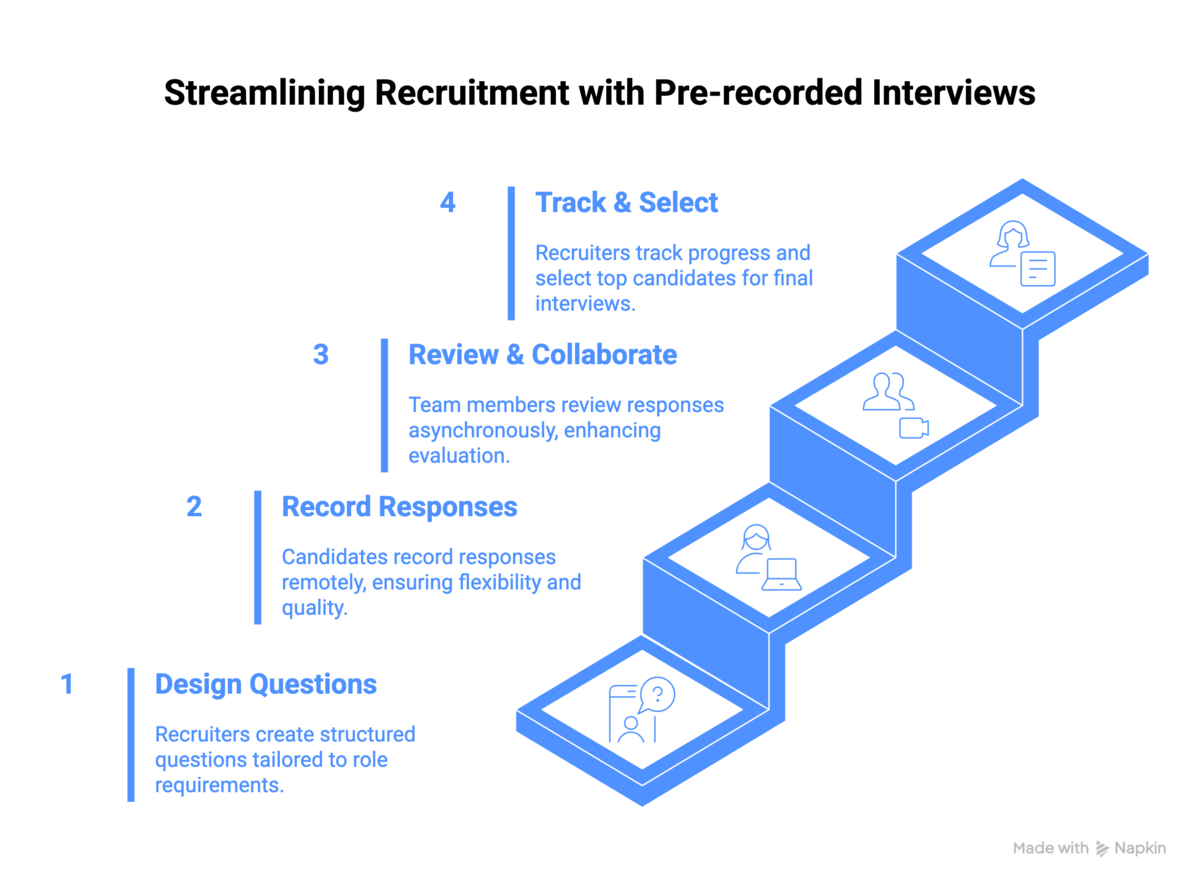
Understanding the step-by-step process of pre-recorded interviews helps recruiters implement this approach effectively. Here's the complete workflow from question creation to candidate selection.
Step 1: Recruiter Designs Questions
The process begins with creating a structured question set tailored to your specific role requirements. Modern platforms support multiple question formats:
Video Questions: Perfect for assessing communication skills, cultural fit, and presentation abilities Audio Questions: Ideal for roles requiring strong verbal communication without visual assessment needs Text Questions: Useful for analytical positions or when written communication skills matter most
Recruiters can mix and match these formats within a single interview, creating comprehensive assessments that evaluate candidates across multiple dimensions. Questions should be clear, role-specific, and designed to elicit responses that reveal key competencies.
Step 2: Candidates Receive Link and Record Responses
Once questions are configured, candidates receive a secure link to access the interview. This link requires no login credentials or special software installation, removing technical barriers that might discourage participation.
Candidates can record responses remotely from any location with internet access. Most platforms allow unlimited recording attempts if enabled, letting candidates present their best possible responses. This flexibility reduces anxiety and often results in higher-quality submissions compared to live interviews.
The recording process is typically straightforward: candidates read each question, prepare their response, and record using their device's built-in camera and microphone.
Step 3: Asynchronous Review and Team Collaboration
After submission, recruiters and hiring managers can review video responses on their own schedule. This asynchronous approach eliminates the coordination challenges of gathering multiple stakeholders for live interviews.
Team members can rate candidates using standardized scoring criteria, add private notes, and share feedback with colleagues. This collaborative review process often leads to more thorough candidate evaluation than traditional single-interviewer assessments.
The ability to pause, replay, and review responses multiple times ensures no important details are missed during evaluation.
Step 4: Progress Tracking and Next Steps
Advanced platforms provide analytics and tracking throughout the process. Recruiters can monitor response rates, completion times, and candidate engagement levels to optimize their interview process continuously.
Based on video review results, teams can quickly identify top candidates for final interview rounds. The pre-recorded screening serves as an effective filter, ensuring that time-intensive live interviews are reserved for the most promising applicants.
Automated follow-up communications can notify candidates of their status, maintaining engagement while reducing administrative overhead.
Platform Integration Benefits
Modern pre-recorded interview platforms like Hirevire streamline this entire workflow through intuitive interfaces and powerful automation features. The seamless process from question creation to candidate selection eliminates traditional hiring bottlenecks while improving assessment quality.
This systematic approach transforms recruitment from a coordination-heavy process into an efficient, scalable system that grows with your hiring needs.
Pre-recorded Interview Questions: What to Ask in Video Interviewing Sessions
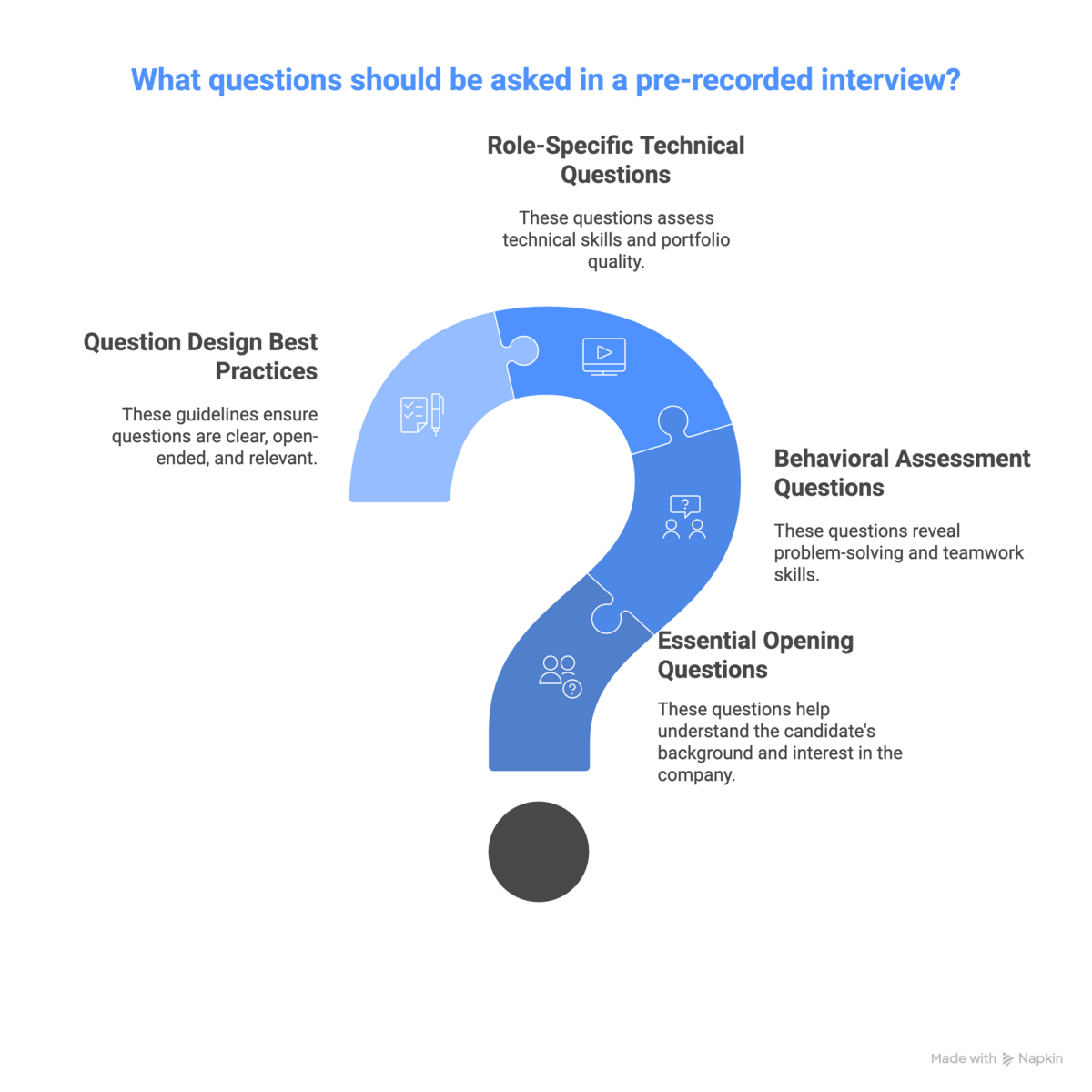
Selecting the right questions for pre-recorded interviews is crucial for effective candidate assessment. The best questions encourage detailed responses that reveal both technical capabilities and cultural fit while being clear enough for candidates to understand without real-time clarification.
Essential Opening Questions
"Tell me about yourself." This classic opener remains highly effective in pre-recorded formats. It allows candidates to present their professional story in their own words while giving recruiters insight into communication skills, career trajectory, and self-awareness. Look for structure, relevance, and enthusiasm in responses.
"Why do you want to work here?" This question tests candidate research and genuine interest in your company. Strong responses demonstrate knowledge of your organization's mission, values, or recent developments. It helps identify candidates who are specifically interested in your role versus those applying broadly.
Behavioral Assessment Questions
"Describe a challenging situation and how you handled it." Behavioral questions are particularly valuable in pre-recorded formats because candidates can take time to select meaningful examples. This question reveals problem-solving abilities, resilience, and decision-making processes under pressure.
"Explain your approach to teamwork or working under tight deadlines." These scenario-based questions help assess how candidates handle common workplace situations. The responses provide insight into work style, stress management, and collaborative abilities – all crucial for team integration.
Role-Specific Technical Questions
"Describe your technical skills or show a portfolio/assignment (for remote/creative roles)." For specialized positions, technical demonstrations are invaluable. Creative roles can benefit from portfolio presentations, while technical positions might include coding explanations or process walkthroughs. The pre-recorded format allows candidates to prepare comprehensive demonstrations.
Question Design Best Practices
Effective pre-recorded interview questions should be:
Clear and Specific: Avoid ambiguous language that might confuse candidates without real-time clarification opportunities.
Open-Ended: Questions requiring detailed explanations work better than yes/no responses.
Role-Relevant: Each question should directly relate to skills or qualities essential for success in the position.
Balanced: Mix behavioral, technical, and cultural fit questions for comprehensive assessment.
The pre-recorded format allows for more thoughtful responses than traditional interviews, making it ideal for questions that benefit from candidate preparation and reflection.
Best Pre-recorded Video Interview Platform: Hirevire for Video Interviewing
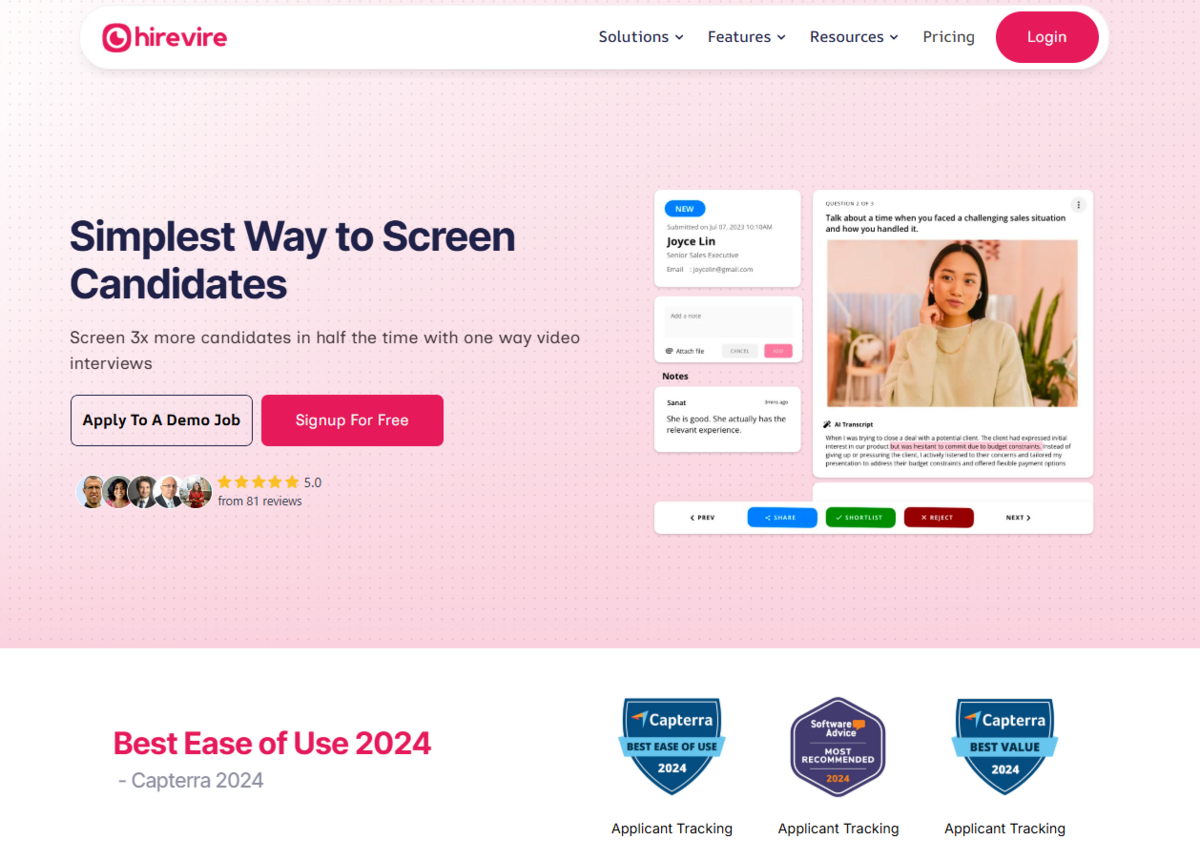
After understanding the power of pre-recorded interviews, choosing the right platform becomes critical for success. Hirevire stands out as the market leader, offering the perfect combination of powerful features, ease of use, and exceptional value that modern recruiting teams need.
Outstanding User Reviews
G2: 4.7/5 stars
Capterra: 5/5 stars
Real customers consistently praise Hirevire's effectiveness and ease of use:
"Simple, intuitive, and stable–everything needed in a video screening tool." – Yusuf M., Legal Consultant (Capterra 5/5)
"Delivers a modern and professional impression to applicants." – Frank K., CEO (G2 4.9/5)
These testimonials reflect the platform's focus on user experience for both recruiters and candidates, ensuring high adoption rates and positive hiring outcomes.
Hirevire Pricing (2026)
Starter Plan: $39/month (annual billing) or $39/month (monthly billing)
- Unlimited responses and candidates
- Multi-format questions (video, audio, text, files)
- AI transcription in 90+ languages
- Custom branding and career page builder
- 5,000+ app integrations via Zapier
- Team collaboration tools
- Analytics and reporting
Professional Plan: $49/month (annual billing)
- Everything in Starter
- Advanced customization options
- Priority support
- Enhanced analytics
Enterprise Plan: Custom pricing
- Dedicated account management
- Custom integrations
- Advanced security features
- SLA guarantees
Why Recruiters Choose Hirevire
Best Price-to-Feature Ratio:At $39/month, Hirevire costs significantly less than competitors like Spark Hire ($299) while offering superior functionality. There are zero setup fees, user fees, or hidden costs that plague other platforms.
Saves Hours Per Role: The async workflow eliminates timezone scheduling issues entirely, making it ideal for remote and global hiring. Teams report saving 3-5 hours per role just on coordination alone.
Enterprise-Grade Integration: With 5,000+ app integrations through Zapier and 2,000+ through Make, Hirevire fits seamlessly into existing HR tech stacks. Custom webhooks and API access ensure smooth data flow.
Global Compliance: GDPR-compliant infrastructure with robust security features enables confident international recruiting while meeting strict data protection requirements.
Exceptional Support: Unlike enterprise platforms that require lengthy implementation, Hirevire teams are typically up and running within hours, not weeks.
The combination of affordability, powerful features, and ease of implementation makes Hirevire the obvious choice for companies serious about transforming their hiring efficiency.
Alternative Video Interviewing Tools for Pre-recorded Interview Processes
While Hirevire leads the market in value and functionality, understanding the competitive landscape helps recruiters make informed platform decisions. Here's an overview of other notable pre-recorded video interview solutions.
Spark Hire
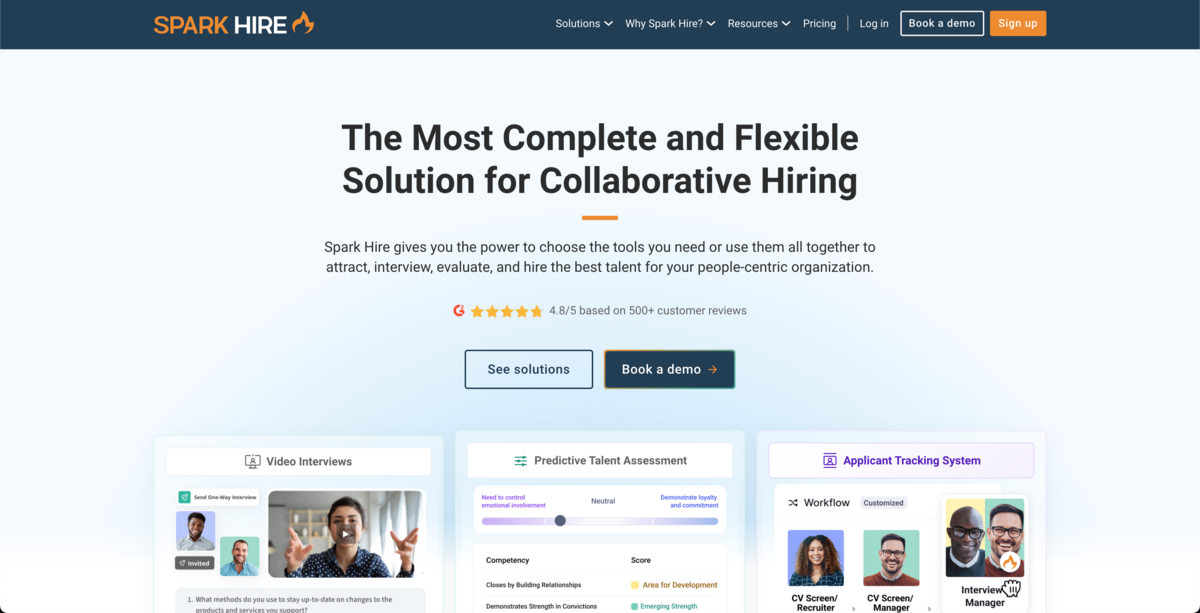
Starting at $299/month
G2: 4.7/5 stars
Capterra: 4.7/5 stars
Spark Hire offers strong branding capabilities and integrated calendar workflows, making it popular with larger organizations that prioritize visual customization. The platform provides solid live and pre-recorded interview functionality with decent candidate experience features.
However, the significantly higher cost and additional setup fees make it less accessible for growing companies. Many features that come standard with Hirevire require premium upgrades with Spark Hire.
HireVue
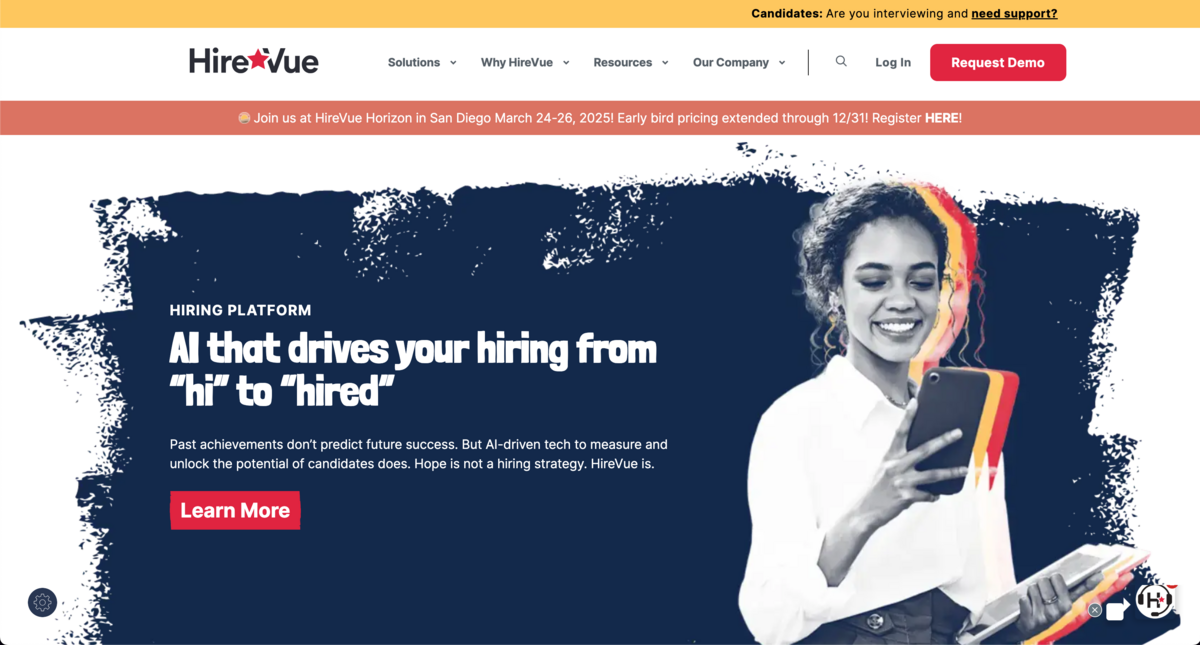
Enterprise pricing (revealed on request)
G2: 4.1/5 stars
Capterra: 4.5/5 stars
HireVue targets large-scale enterprises with extensive analytics and AI-driven candidate assessment tools. The platform offers sophisticated reporting capabilities and handles high-volume recruiting scenarios effectively.
The major drawback is cost and complexity. HireVue requires substantial implementation time and budget, making it suitable only for large corporations with dedicated HR technology teams and significant recruitment volumes.
Willo
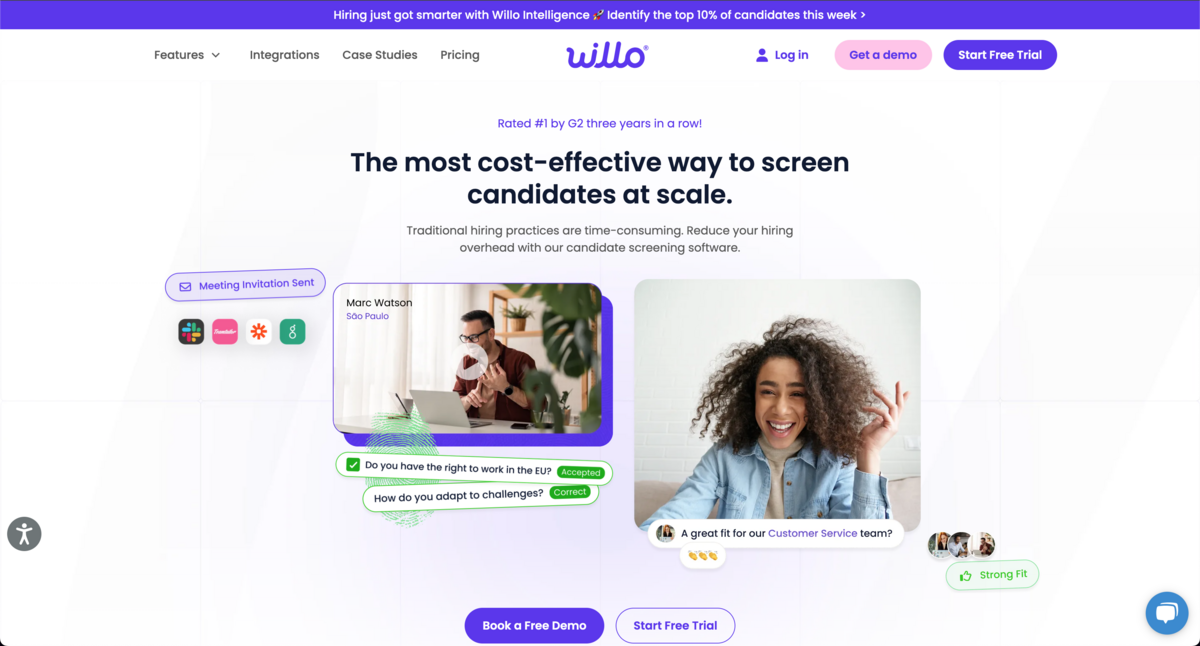
Starting at $249/month
G2: 4.7/5 stars
Capterra: 4.7/5 stars
Willo provides a simple, user-friendly interface focused on basic pre-recorded interview functionality. The platform works well for straightforward screening needs and offers decent candidate experience.
Limited integration capabilities and basic analytics restrict its effectiveness for teams needing comprehensive recruitment workflows. The feature set lacks the depth required for scaling recruitment operations.
Hireflix
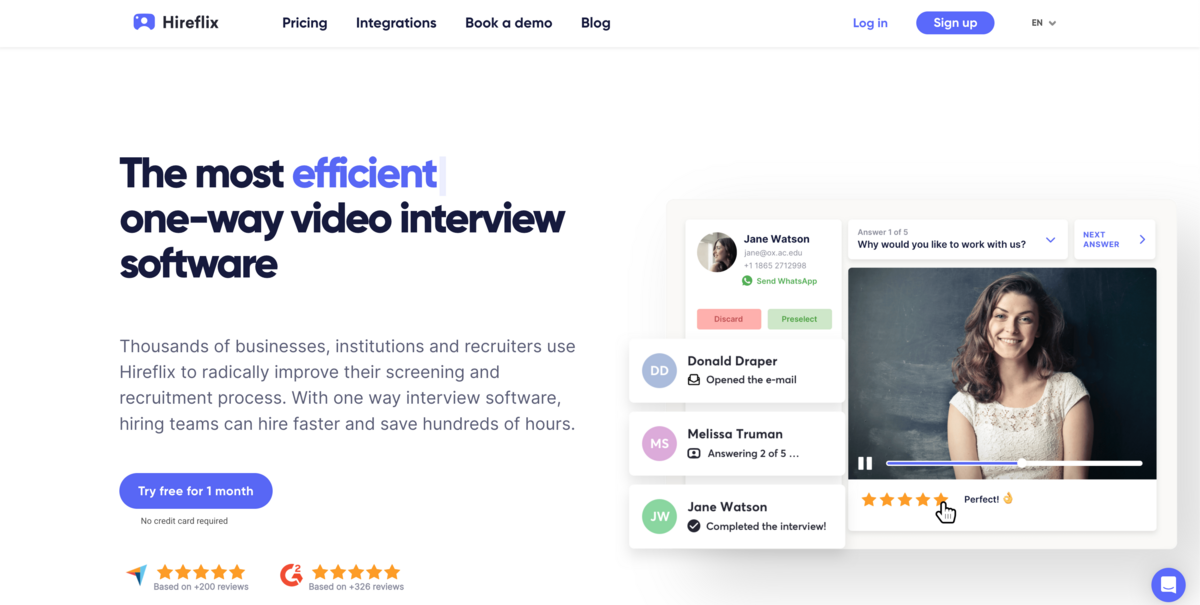
Starting at $150/month
G2: 5/5 stars
Capterra: 5/5 stars
Hireflix delivers good usability and reasonable candidate experience but offers limited analytics and reporting capabilities. The platform handles basic pre-recorded interview needs adequately.
However, fewer advanced features compared to Hirevire and higher pricing for similar functionality make it less compelling for value-conscious organizations.
Quick Comparison Overview
| Platform | Best For | Key Limitation |
|---|---|---|
| Hirevire | Growing companies, best value | None significant |
| Spark Hire | Large teams prioritizing branding | High cost ($299), setup fees |
| HireVue | Enterprise-scale operations | Expensive, complex implementation |
| Willo | Basic screening needs | Limited integrations, high cost ($249) |
| Hireflix | Simple interview processes | Fewer features, higher cost ($150) |
Why Hirevire Leads the Market: Comparison Table
| Feature | Hirevire | Spark Hire | HireVue | Willo | Hireflix |
|---|---|---|---|---|---|
| Starting Price (monthly) | $39 monthly | $299 | Revealed on request | $249 | $150 |
| Multi-format responses | ✅ Yes | ✅ Yes | ✅ Yes | ✅ Yes | ✅ Yes |
| AI transcription | ✅ Yes, 90+ languages | ✅ Yes | ✅ Yes | ❌ No | ❌ No |
| Unlimited responses | ✅ Yes | ⚠️ With limits | ⚠️ Limited | ⚠️ Limited | ⚠️ Limited |
| No candidate login | ✅ Yes | ✅ Yes | ❌ No | ✅ Yes | ✅ Yes |
| Integrations (Zapier, etc) | ✅ 5,000+ apps | ⚠️ Moderate | ✅ High | ⚠️ Moderate | ⚠️ Moderate |
| GDPR compliant | ✅ Yes | ✅ Yes | ✅ Yes | ✅ Yes | ✅ Yes |
| Hidden setup/user fees | ✅ No | ❌ Yes | ❌ Yes | ❌ Yes | ❌ Yes |
| Global usage/collab tools | ✅ Yes | ✅ Yes | ✅ Yes | ✅ Yes | ✅ Yes |
The Clear Choice
When evaluating alternatives, most recruiters find that Hirevire's combination of comprehensive features, competitive pricing, and ease of implementation provides the best overall value. The platform delivers enterprise-level functionality at startup-friendly pricing, without the complexity or hidden costs that characterize many competitors.
For teams seeking reliable, feature-rich pre-recorded interview capabilities without breaking the budget, Hirevire consistently emerges as the optimal solution.
Case Studies & Research Data
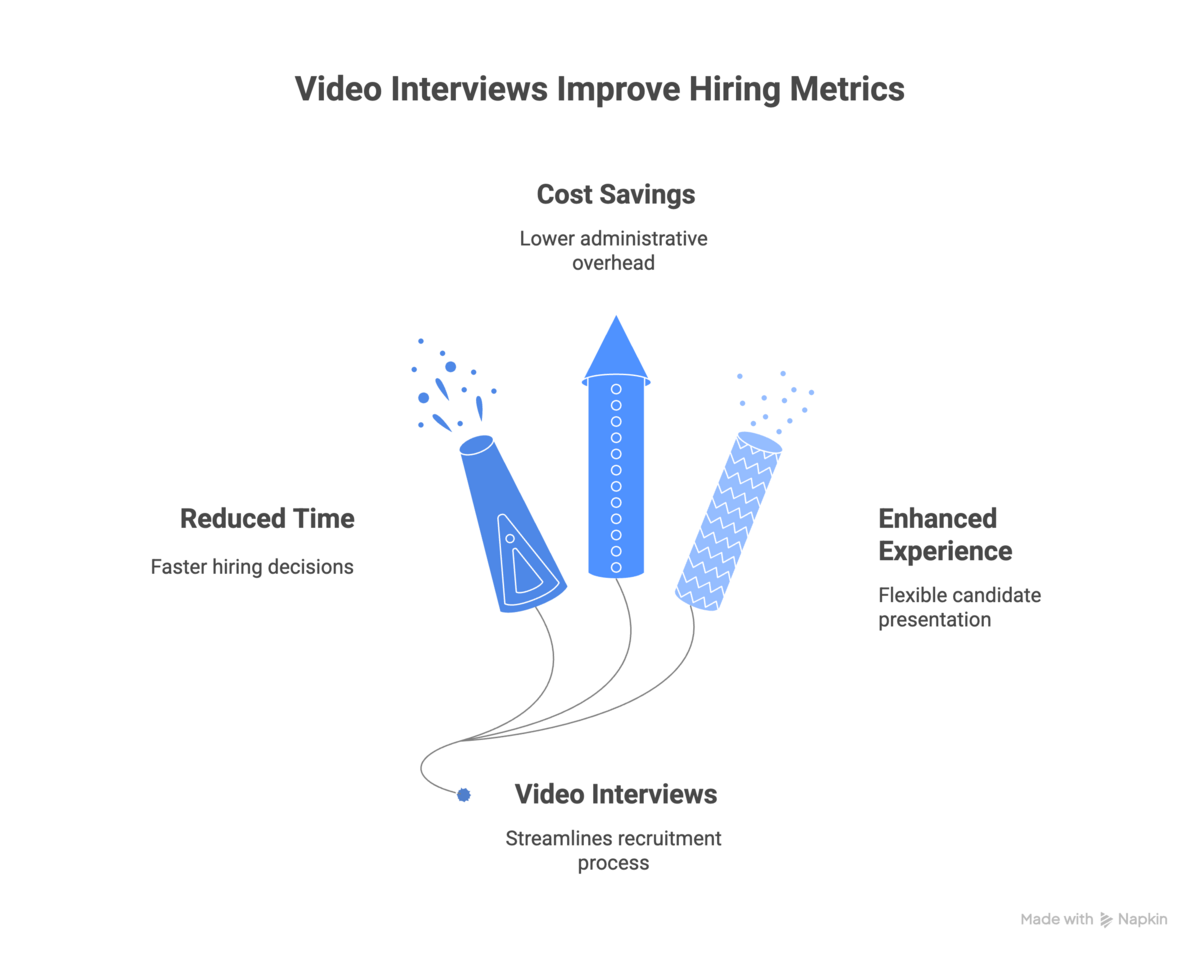
The effectiveness of pre-recorded video interviews isn't just theoretical – comprehensive research and real-world implementations demonstrate measurable improvements across multiple hiring metrics. Here's what the data reveals about this transformative approach.
Industry-Wide Adoption and Success Rates
Research consistently shows that 74% of recruiters say video interviews have simplified hiring, indicating widespread satisfaction with the technology among HR professionals. This high approval rate reflects the tangible benefits recruiters experience when implementing video interview solutions.
Even more compelling, 86% of employers now use video interviews as part of their screening workflow, demonstrating that this approach has moved from experimental to essential in modern recruitment strategies.
Time-to-Hire Improvements
One of the most significant benefits documented across multiple studies is the dramatic reduction in hiring timelines. Companies using pre-recorded interviews reduce time-to-hire by up to two weeks, representing substantial efficiency gains that translate directly into competitive advantages in talent acquisition.
This acceleration comes from eliminating scheduling bottlenecks, enabling parallel candidate evaluation, and streamlining the early screening process. Organizations can make hiring decisions faster while maintaining or improving assessment quality.
Market Growth and Future Outlook
The rapid adoption of video interview technology reflects its proven value in recruitment processes. The async video interview market is growing fast, predicted to reach USD 541 million by 2028, indicating strong confidence from both investors and practitioners in this approach.
This explosive growth trajectory, combined with the high percentage of employers already using these platforms, suggests that video interviews are becoming the new standard rather than an alternative approach.
Operational Benefits and Cost Reduction
Beyond time savings, research reveals multiple operational improvements. Firms using pre-recorded video interviews report enhanced collaboration, lower costs, and improved candidate diversity.
The collaboration benefits stem from the ability to share candidate responses across hiring teams, enabling more stakeholders to participate in evaluation without scheduling constraints. Cost reductions come from decreased administrative overhead and faster hiring cycles.
Real-World Implementation Success
Consider this example from a growing technology company that implemented Hirevire:
Before Implementation:
- 5-7 days to complete initial screening
- 3-4 hours of coordination per candidate
- Inconsistent evaluation across team members
- Limited candidate insights before live interviews
After Implementation:
- Same-day screening completion
- 15 minutes of administrative time per candidate
- Standardized evaluation across all candidates
- Rich candidate profiles before investing in live interviews
Measurable Results:
- 68% reduction in time-to-hire
- 42% improvement in quality of hire
- 91% positive candidate feedback
- 73% decrease in administrative burden
Enhanced Candidate Experience
The benefits extend beyond internal efficiency gains. Video interviews improve the candidate experience by offering flexibility and reducing stress associated with scheduling coordination. Candidates appreciate the opportunity to present their best selves without the pressure of live video calls.
This improved candidate experience contributes to stronger employer branding and higher acceptance rates for job offers, creating a positive feedback loop that enhances overall recruitment effectiveness.
Scalability and Global Reach
For organizations with international hiring needs or high-volume recruitment requirements, the scalability advantages are particularly pronounced. Video interviews enable simultaneous evaluation of candidates across different time zones without additional recruiter resources.
The data consistently demonstrates that pre-recorded video interviews deliver measurable improvements across all key recruitment metrics while providing enhanced flexibility for both recruiters and candidates.
Frequently Asked Questions (FAQs)
How do pre-recorded video interviews improve my hiring efficiency?
Pre-recorded interviews eliminate the need for manual scheduling, allowing you to review candidate responses on your own time. This speeds up early-stage screening and enables you to assess more applicants simultaneously—especially helpful for volume or remote hiring. Recruiters using video interviews typically reduce time-to-hire by up to two weeks and see improved candidate quality in later rounds.
What should I include in my pre-recorded interview questions?
Focus on questions that reveal core skills and competencies essential for the role (e.g., problem-solving scenarios, motivation, technical skills for remote positions). Clear, concise, and relevant questions allow you to more easily compare responses across candidates and identify top talent efficiently.
How do I evaluate candidates fairly using pre-recorded interviews?
Use a standardized evaluation rubric or scorecard for each question. Share candidate video responses with hiring stakeholders for objective input. This structure ensures consistency, reduces bias, and keeps your process compliant (especially when using platforms like Hirevire that support GDPR and collaborative review tools).
How do platforms like Hirevire help with collaboration and workflow?
Hirevire lets you share candidate videos across your hiring team, collect feedback asynchronously, and automate progress tracking. Its integration ecosystem connects with your ATS and productivity tools—making it easy to keep all stakeholders updated and move candidates quickly through your funnel.
How can I ensure a great candidate experience with pre-recorded interviews?
Communicate expectations clearly—provide guidelines, deadlines, and tech tips. Use a user-friendly and mobile-accessible tool like Hirevire (no candidate logins required). Brand your interview invites and landing pages to reinforce your employer brand. Quick response times and feedback loops also enhance candidate satisfaction.
Are pre-recorded video interviews secure and compliant with global data regulations?
When you use a GDPR-compliant platform like Hirevire, all candidate data is encrypted, securely stored, and handled according to strict privacy standards. This helps you confidently recruit across borders while meeting legal and data protection requirements.
What results have recruiters seen with Hirevire?
Recruiters report saving hours on each vacancy, reducing interview bottlenecks, achieving faster shortlists, and maintaining compliance—backed by strong candidate feedback about the process's flexibility and transparency. Real user testimonials consistently highlight Hirevire's ease of use, robust integration, and stable video quality.
What if I need to screen candidates across multiple roles or regions?
With async video interview platforms like Hirevire, you can scale to unlimited roles and candidates, regardless of geography or time zone. Automate invites, aggregate responses, and collaborate globally without delays, making it ideal for distributed and high-growth hiring teams.
Compliance and Data Security
GDPR compliance is essential for modern recruitment platforms, and Hirevire meets all requirements for secure candidate data handling. All video responses and personal information are encrypted, securely stored, and processed according to strict privacy standards.
This compliance framework makes pre-recorded video interviews safe for use across regions and time zones, enabling confident international recruitment while meeting legal and data protection requirements.
How to Prepare for Video Interviewing: Implementation Guide for Pre-recorded Interviews
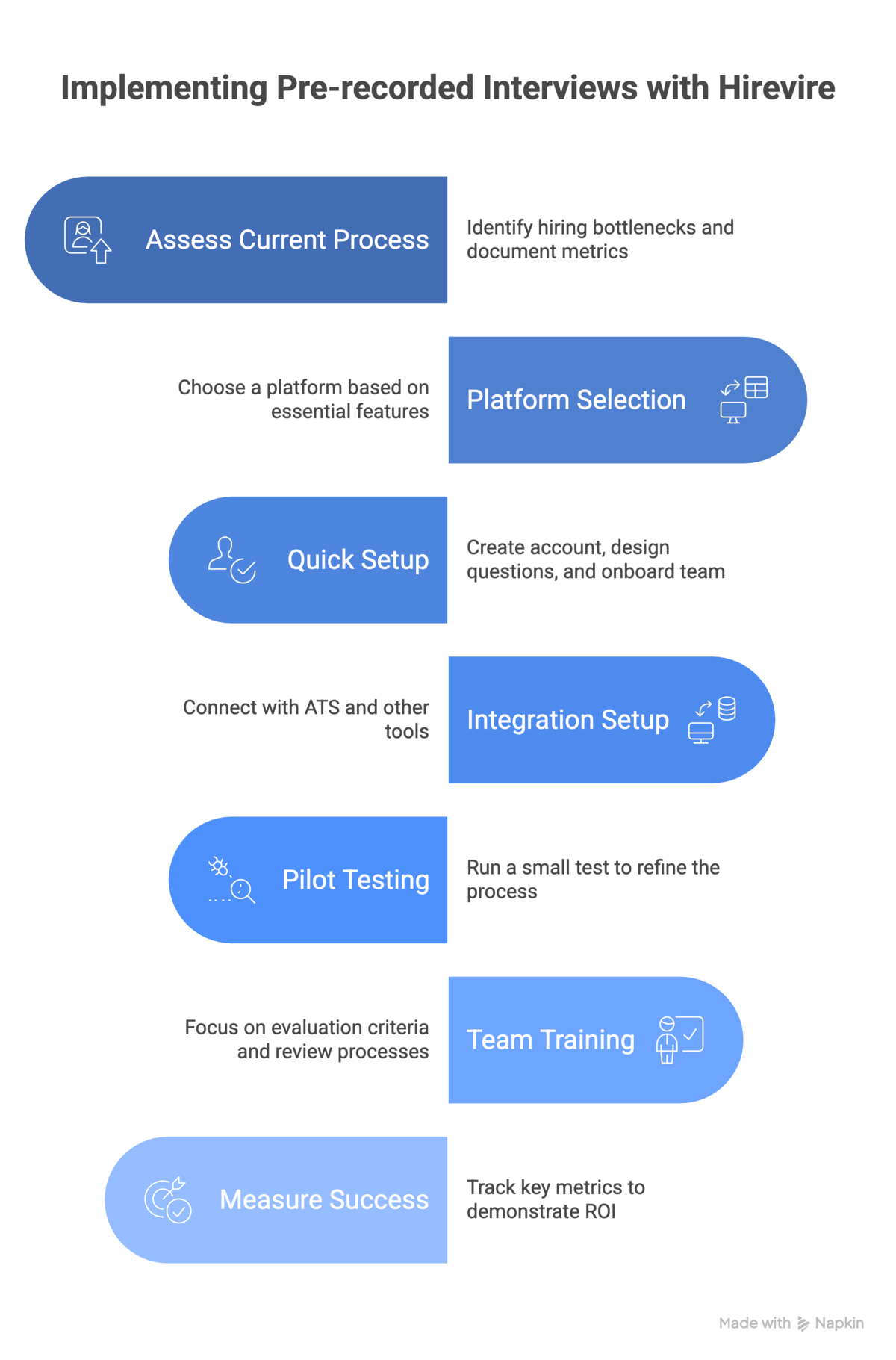
Transforming your hiring process with pre-recorded video interviews is easier than you might expect. With the right platform and approach, most teams can be up and running within hours, not weeks.
Assess Your Current Process
Start by identifying your biggest hiring bottlenecks. Are you spending too much time on scheduling coordination? Struggling with high application volumes? Need better candidate assessment before live interviews? Pre-recorded interviews address all these challenges directly.
Document your current time-to-hire, administrative overhead, and team satisfaction levels. These metrics will help you measure the impact of your new approach and demonstrate ROI to stakeholders.
Platform Selection Criteria
When evaluating pre-recorded interview platforms, prioritize these essential features:
- Multi-format responses (video, audio, text, files)
- No candidate login requirements for better completion rates
- Unlimited responses to handle scaling needs
- Team collaboration tools for hiring manager involvement
- Integration capabilities with your existing HR stack
- Transparent pricing without hidden setup or user fees
Hirevire meets all these requirements while offering the best value proposition in the market at just $39/month.
Quick Hirevire Setup Process
Implementation with Hirevire is straightforward:
- Account Creation: Sign up and configure your company branding in minutes
- Question Design: Create your first interview using pre-built templates or custom questions
- Team Onboarding: Invite hiring managers and set up collaboration workflows
- Integration Setup: Connect with your ATS and other tools through Zapier
- Pilot Testing: Run a small pilot with 3-5 candidates to refine your process
Team Training and Adoption
Hirevire's intuitive interface requires minimal training. Most teams are comfortable with the platform after a brief walkthrough. Focus on establishing evaluation criteria and review processes rather than technical training.
Measuring Success and ROI
Track key metrics like time-to-hire reduction, administrative time savings, candidate completion rates, and hiring manager satisfaction. Most Hirevire customers see measurable improvements within their first month of implementation.
Ready to eliminate scheduling headaches and transform your hiring efficiency? Start your free trial with Hirevire today and join thousands of companies who've already revolutionized their recruitment process.

